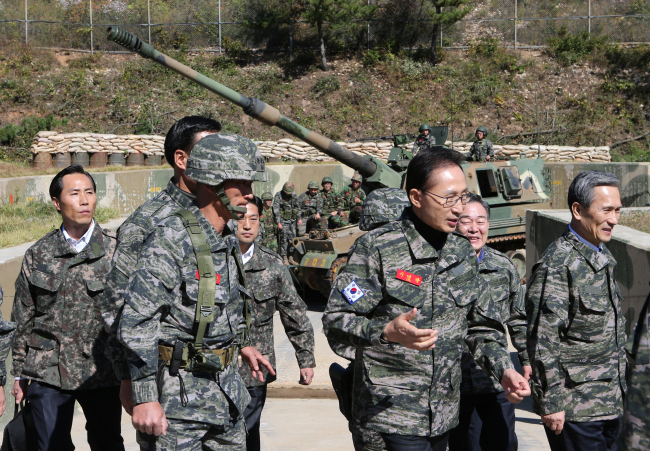In the crucial weeks ahead of the presidential election, rival parties have been wrangling over the allegation surrounding late President Roh Moo-hyun’s stance on the Northern Limit Line in the West Sea.
The dispute over whether the past government suggested it was willing to compromise over the NLL exposed not only the internal split in South Korea but a deeper dilemma faced by the peninsula that remains technically at war.
Opinions vary on whether the NLL can or should be defined as a territorial demarcation, and whether a proposed joint fishing zone with the North around the NLL could secure peace or pose riskier threat.
North Korea, on its part, claims a new maritime demarcation must be drawn and a joint fishing area should be set up further south, further dimming the prospects for a breakthrough.
Due to the exceptional situation at the time of the Korean War (1950-1953) that led to the maintenance of the NLL, international law experts often suggest a political approach is the best alternative.

President Lee Myung-bak surveys the military vigilance during his visit to Yeonpyeongdo on Oct. 18. It was the first time that Lee had visited the island near the Northern Limit Line, which was hit by North Korean artillery two years ago, leaving two South Korean Marines and two civilians dead. (Yonhap News)
With national defense taking the priority in a country faced by the constant threats from North Korea, the NLL issue remains one of the biggest tasks for the next president to decipher.
The NLL fiasco erupted on Oct. 8, when Rep. Chung Moon-hun of the Saenuri Party charged that Roh had pledged to nullify the NLL at an undisclosed private meeting with then-leader of North Korea Kim Jong-il on the sidelines of their summit talks in 2007. Upon the summit meeting, he said the two had agreed to create a joint fishing area and a peace zone in the West Sea. Follow-up talks, however, did not bear fruit and the agreement was put on the backburner upon the launch of the Lee Myung-bak administration.
Chung’s claim, meanwhile, quickly spilled over to the main opposition Democratic United Party’s presidential candidate Rep. Moon Jae-in, who was Roh’s chief of staff at the time.
Moon and the DUP denounced the Saenuri Party for politicizing the security issue, stating that past governments have always upheld the NLL.
Chung and the Saenuri Party have stuck to their allegations, additionally claiming that Roh had ordered relevant minutes to be deleted.
Testimonies of former and incumbent security officials varied over the existence of the minutes or the alleged comments by Roh.
Despite the National Intelligence Service Director Won Sei-hoon’s testimony last week that there was no record of an undisclosed meeting between Roh and Kim, the controversy persists with legal battles between the parties looming.
The DUP has filed a complaint against senior presidential security secretary Chun Young-woo over his claim to have read the minutes of the inter-Korean summit for violating the Act on the Management of Presidential Archives. The main opposition party has also filed a complaint against three Saenuri Party members including Chung for attempting to damage Moon’s campaign.
North Korea also jumped into the fray by once again openly denouncing the NLL on Oct. 22.
Since 1973, North Korea has been denying the maritime demarcation that has been serving as the de facto maritime boundary between the two Koreas upon the cease-fire treaty in 1953.
Interpretations vary on whether North Korea formally agreed to the NLL drawn up by the United Nations Command. But past records of North’s statements and actions show it did not object to the demarcation until at least 1973.
Provocations by the North across the NLL have surged since then.
Military battles in the West Sea in 1999 and 2002, and the Cheonan sinking and the Yeongpyeongdo shelling in 2010 all occurred around the NLL, with the North increasingly violating the demarcation in an apparent attempt to invalidate the line. Since 1999, North Korea has claimed a “West Sea military demarcation line” moved further to the South.
By Lee Joo-hee (
jhl@heraldcorp.com)



![[Herald Interview] 'Amid aging population, Korea to invite more young professionals from overseas'](http://res.heraldm.com/phpwas/restmb_idxmake.php?idx=645&simg=/content/image/2024/04/24/20240424050844_0.jpg&u=20240424200058)


![[Pressure points] Leggings in public: Fashion statement or social faux pas?](http://res.heraldm.com/phpwas/restmb_idxmake.php?idx=645&simg=/content/image/2024/04/23/20240423050669_0.jpg&u=)